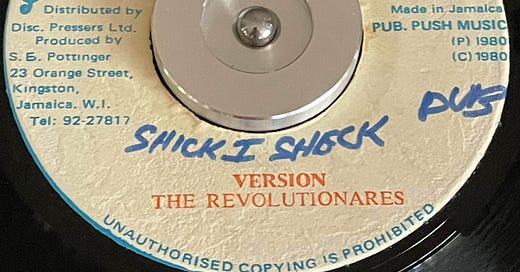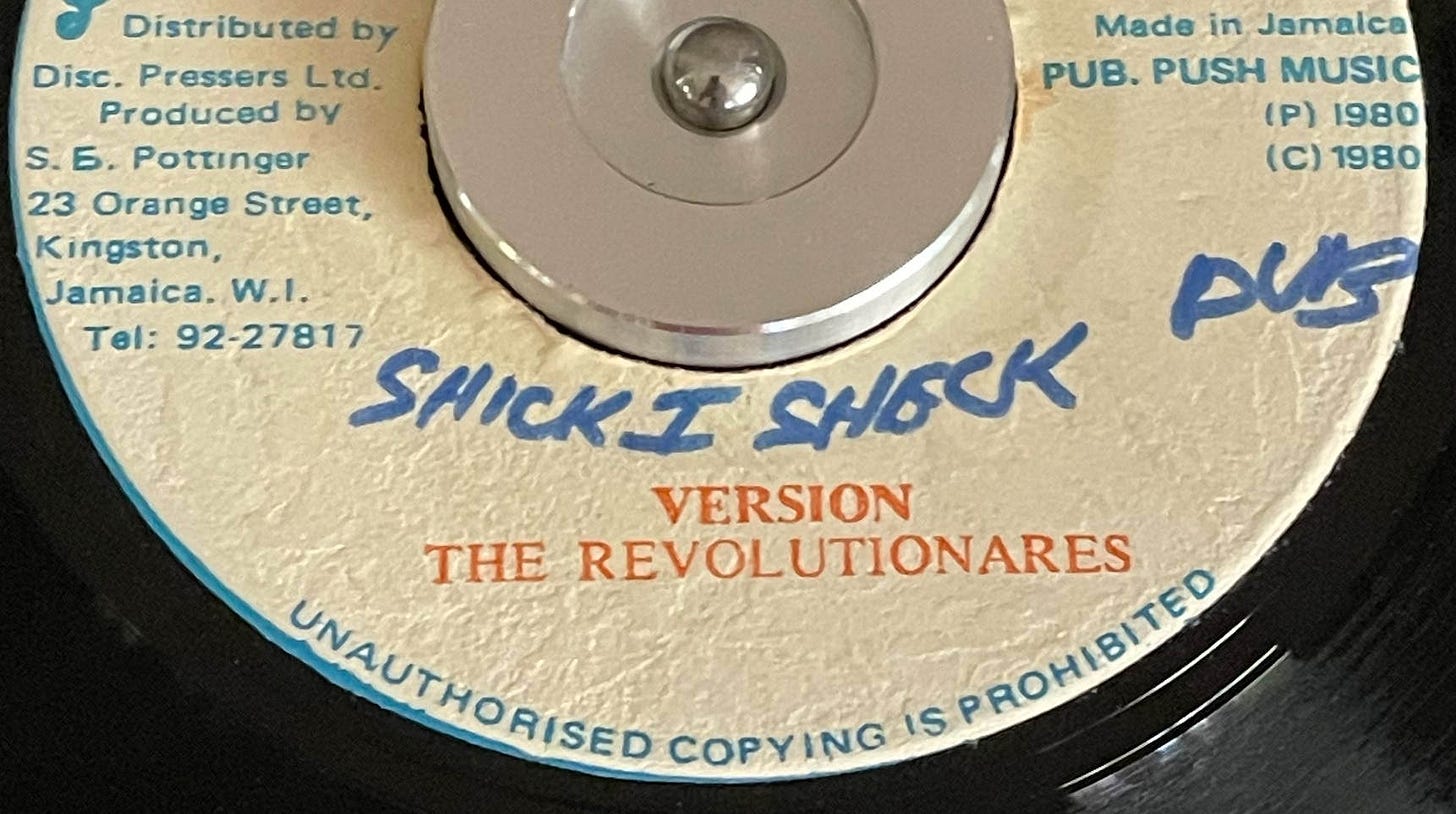"Shank I Sheck" riddim by Errol Scorcher with The Revolutionaries on Dance Hall Records from 1980 … Side A features Errol Scorcher’s "Sounds of Hon. Marley" a tribute to Bob Marley recorded and released shortly after his death in 1981, though some pre-printed labels indicate 1980. Our pick today is B Side : a horn-heavy instrumental version of the riddim, showcasing The Revolutionaries’ signature rockers style, with a killer dub arrangement. Positive Vibration!
Description:
Side A ("Sounds of Hon. Marley"): A deejay-style track where Errol Scorcher, a prominent Jamaican dancehall deejay, toasts over the "Shank I Sheck" riddim, paying tribute to Bob Marley by quoting lyrics from songs like "Redemption Song" and "Rastaman Vibration." The track captures the early dancehall style with Scorcher’s energetic delivery.
Side B ("Celebration"): A horn-heavy instrumental version of the riddim, showcasing The Revolutionaries’ signature rockers style, with a killer dub arrangement suitable for sound system play.
Production: Produced by Errol Scorcher under his Scorcher label, with The Revolutionaries as the backing band, recorded at Channel One Studios. The Revolutionaries, featuring musicians like Sly Dunbar (drums), Robbie Shakespeare (bass), and others, were the house band for Channel One, known for their influential rockers sound
Historical Context
Errol Scorcher: A veteran deejay from Saint Catherine, Jamaica, Scorcher rose to prominence in the late 1970s with hits like "Peace Truce" and "Roach in a De Corner." By 1980, he was a key figure in the emerging dancehall scene, often collaborating with The Revolutionaries and producers like Sonia Pottinger and Prince Jammy.
The Revolutionaries: Formed in 1975 as Channel One’s house band, they pioneered the rockers style, characterized by heavy basslines and militant drum patterns. Their work on "Shank I Sheck" for this track aligns with their reputation for creating versatile, hard-hitting riddims.
"Shank I Sheck" Riddim: Originally a ska instrumental by Baba Brooks in the early 1960s, it was adapted into rocksteady and reggae forms by the late 1970s. Scorcher’s 1980/1981 version uses a dancehall reinterpretation, with The Revolutionaries providing a robust, horn-driven backing track ideal for toasting.
Origins and Initial Recording
Original Track: The "Shank I Sheck" riddim began as a ska instrumental by trumpeter Baba Brooks, recorded in the early 1960s and produced by King Edwards. The title is a playful derivation of the name of the Chinese Nationalist leader Chiang Kai-Shek (1887–1975).
Musical Characteristics: The original recording featured prominent solos by Baba Brooks (trumpet) and Ernest Ranglin (guitar), with Val Bennett contributing a tenor saxophone riff that became the foundation for the riddim’s bassline in later versions. This riff is a defining element, giving the track its distinctive sound.
Context: As one of the early ska riddims, "Shank I Sheck" emerged during Jamaica’s ska era (late 1950s to mid-1960s), a period when the island’s music was transitioning from mento and R&B influences into a uniquely Jamaican sound. The riddim was part of the vibrant ska scene that laid the groundwork for rocksteady and reggae.
Evolution and Key Versions
Bobby Ellis’ Update: In the late 1960s, trumpeter Bobby Ellis recorded a version of "Shank I Sheck" for producer Sonia Pottinger. This version slowed down the tempo slightly, adapting it to the emerging rocksteady and early reggae styles. Val Bennett’s saxophone riff was repurposed as the bassline, played by both bass and saxophones, setting the template for subsequent recordings.
Late 1970s Adaptations: By the late 1970s, Yabby U recorded an instrumental adaptation titled "Love In Zambia" (also released as "Zambia"), which further evolved the riddim into the roots reggae era. This version maintained the core structure but incorporated a heavier, more dub-influenced sound.
Coxsone Dodd’s Contributions: Legendary producer Clement "Coxsone" Dodd of Studio One recorded a notable vocal version with Devon Russell called "Thanks And Praise", showcasing the riddim’s versatility for vocal performances. Dodd also produced DJ versions by artists like Jim Brown and Lone Ranger, reflecting the growing influence of toasting and dancehall styles.
Third Riddim Album: The "Shank I Sheck" riddim was featured in one of the earliest "one-riddim" albums, a format where multiple artists record over the same instrumental track. This album, noted as only the third of its kind after Yamaha Skank and Master Showcase, included standout tracks like Sugar Minott’s "African Girl," Barrington Spence’s "Rockers Time," and Joy Card’s "Black Girl." A discomix version of Joy Card’s track featured a masterful mix, and Bullwackie (Lloyd Barnes) produced a notable instrumental with Roland Alphonso.















Share this post